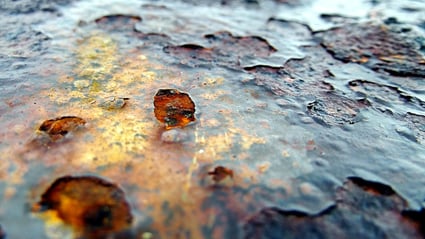 Question: If water causes steel to rust, why doesn’t the inside of my water heater tank rust out?
Question: If water causes steel to rust, why doesn’t the inside of my water heater tank rust out?
Answer: It will eventually, unless you have a working anode rod installed.
What is a water heater anode rod?
It’s a fact of nature that water corrodes many kinds of metals—steel most noticeably. But here’s where a bit of cleverness comes in with the invention of the water heater. If you introduce a rod of more “tempting” (that is, more easily corroded) metal into the environment, the water will react with that and leave the steel unaffected.
That’s the sole purpose of an anode rod—it’s a “sacrificial” rod of metal that exists to be destroyed over time by the water in your storage tank. Without it, your water heater would quickly rust out.
Checking and replacing an anode rod
The lifespan of the anode rod varies depending on whether you have soft or hard water. Soft water tends to have a bigger appetite for metal, potentially dissolving the rod within a single year.
You should make a habit of checking on your anode rod annually. If you have a water heater model with an easily accessible rod (check your owner’s manual), you may be able to do this yourself. However, if you’re not sure about your model or aren’t able to locate or remove the anode rod, it’s probably best to get a professional plumber before accidentally damaging the heater trying to get it out.
When the rod has deteriorated to the point where large portions of the wire at its core are showing, it’s time to replace it.
Magnesium or aluminum?
Anode rods are available for purchase at most home improvement stores, or you can easily get one from your plumber. These rods typically range in price from $15 to $60. One of the major differences you’ll see among anode rods is in the material they're made from. Here are the pros and cons of the most common varieties:
- Magnesium offers better protection overall, though it tends to have a shorter lifespan and is typically more expensive. Occasionally, magnesium can react poorly with certain water chemistry to create a sulfur-like smell.
- Aluminum is often mixed with zinc in anode rods. These rods tend to be less expensive and last longer, though they don’t offer the same level of protection. Unlike magnesium, aluminum rods can actually neutralize odors in water. Some homeowners are concerned about aluminum levels in their drinking water (though typically you don’t drink water coming from the hot water tank).
If in doubt, your plumber can recommend an option based on your home’s water chemistry.
Flushing out sediments
At this point you may be wondering—if the anode rod completely dissolves, where does all that metal go? Much of this ends up as sediment at the bottom of your water storage tank, which if allowed to build up too long, can hamper your water heater’s performance and eventually travel through your pipes and cause trouble throughout your plumbing system.
Just so you know, sediment would build up even if you didn’t have the rod—it would just be rust particles from the sides of your tank!
To avoid issues with sediments in your water and to keep your water heater efficient, you’ll need to get your water heater flushed out regularly—typically once a year. (If you’re part of Ken’s Diamond Club, this service is included so you don’t have to remember to schedule it.)
Have other questions about your water heater? Check out our comprehensive guide. And if you’re having specific troubles that need immediate attention, you can contact Ken’s Plumbing any time during the day or night!


.png)